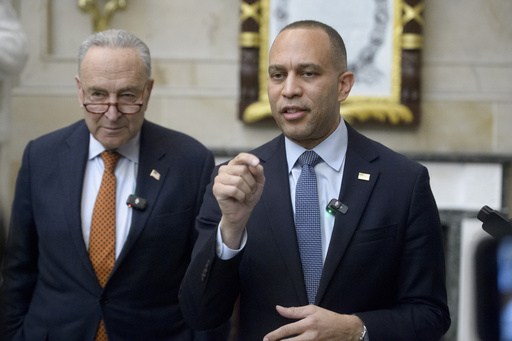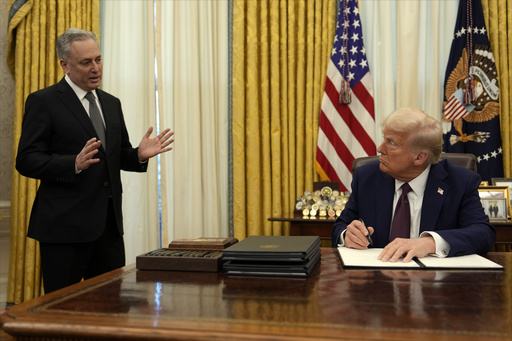NEW YORK — While Donald Trump holds the presidency, it is the billionaire Elon Musk who has become the target for a wave of protests initiated by thousands of Democratic activists this week. The demonstrations aim to resist the administration’s efforts to slash funding to federal health, education, and human services agencies.
Numerous protests are planned outside Tesla dealerships and congressional office locations. Organizers aim to relay a strong message to Congress members who are currently on break. Although the protests have not reached the fervor seen during and after Trump’s initial inauguration eight years ago, a coalition of Democrats and progressives is rallying against Musk, who has emerged as a significant figure in supporting Trump’s policies and influencing the federal workforce.
Ezra Levin, a co-founder of the progressive organization Indivisible, noted that Musk represents a critical vulnerability within the “MAGA” coalition. He remarked, “It’s hard to imagine something less popular than the idea that the richest man in the world is threatening your Social Security or your Meals on Wheels.”
Indivisible, which claims over 1,300 chapters across the nation, is encouraging members to stage protests at their local congressional offices, regardless of party affiliation. They have also provided a detailed guide for individuals looking to demonstrate at Tesla dealerships. The guidance emphasizes maintaining a presence in public spaces and refraining from actions that might disrupt business activities, such as blocking access or trespassing. Protesters are urged to concentrate on the message that their demonstrations target Musk’s political maneuvers rather than his companies, Tesla, SpaceX, or Twitter.
Vermont Senator Bernie Sanders has announced his plans for a national tour dubbed “a national tour to fight oligarchy,” marking stops in working-class districts in Iowa and Nebraska this week. Additionally, the newly appointed Democratic National Committee Chair, Ken Martin, will embark on his inaugural trip as the party leader, visiting states such as Pennsylvania, Texas, Illinois, Wisconsin, and Missouri to engage with local Democratic officials and labor union representatives. According to spokesperson Hannah Muldavin, Martin plans to address Musk’s involvement with the Department of Labor, stressing the potential risks posed to crucial economic data like unemployment rates, which are vital for America’s workforce.
Recognizing the dissatisfaction among their base, several House Democrats are taking proactive measures. The House Democratic Policy and Communications Committee issued a memo encouraging members to participate in “nine days of visibility.” These efforts include hosting at least one town hall event, either in person or by phone, as well as a community gathering that underscores the “devastating impacts” of actions taken by Trump and Musk.
This surge in protests coincides with a crucial period, as the divided Democrats attempt to counteract the Republican president’s extensive staffing cuts affecting various federal agencies, which include departments focusing on public health, education, veterans affairs, and more. Some recent firings within the Department of Veterans Affairs involved researchers working on significant issues such as cancer treatments and opioid addiction. Notably, over 5,000 staff members from the Department of Health and Human Services and about 10 percent of the workforce at the Centers for Disease Control and Prevention have also been impacted.
In alignment with Trump’s directives, Musk’s team is reportedly attempting to dismantle entire agencies without congressional consent, including the U.S. Agency for International Development, the Department of Education, and the Consumer Financial Protection Bureau. Trump has justified these budget reductions by citing the need to eradicate waste and fraud, praising Musk’s efforts through the Department of Government Efficiency, which has reportedly uncovered considerable evidence of financial misallocation. He has further enhanced Musk’s authority through an executive order.
Musk has defended the swiftness of his cuts across federal systems, while admitting that errors have been made. Meanwhile, congressional Democrats have denounced these developments as perilous. However, with the lack of majority control over Congress, their options to challenge the Trump administration have become limited, mostly falling to judicial avenues. Despite this, three significant progressive organizations—Indivisible, MoveOn, and the Working Families Party—are working together to make their discontent clear through coordinated protests this week aimed at sending a decisive message to both electoral parties regarding the need for greater action.
Democrats in Congress are also facing potential backlash from their constituents. MoveOn, claiming a near-10 million membership, is organizing multiple demonstrations near town halls and the offices of congressional members who do not engage in public discussions. Their strategy centers on persuading House Republicans crucial to countering the Trump-Musk agenda while also targeting notable Democrats like House Democratic Leader Hakeem Jeffries and Senate Democratic Leader Chuck Schumer from New York.
“We are witnessing a genuine resurgence of energy in opposition to what Trump, Musk, and Republicans are doing to our nation,” stated MoveOn Executive Director Rahna Epting, emphasizing that “people are furious.” The Working Families Party is concentrating their protests within vulnerable Republican districts across California, New Jersey, New York, Pennsylvania, and Wisconsin, featuring testimonies from individuals affected by the cuts initiated by the Trump administration, including educators, nurses, and early childhood program workers.
According to Working Families spokesperson Ravi Mangla, many Republicans have not yet faced adequate scrutiny for their actions. “A lot of Republicans,” Mangla remarked, “have not been held accountable.”






